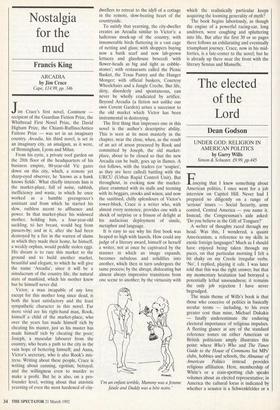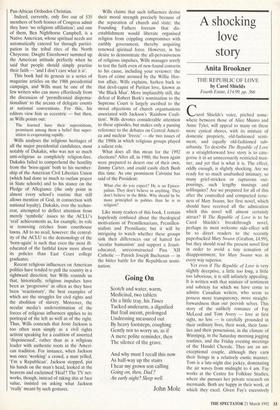The elected of the Lord
Dean Godson
UNDER GOD: RELIGION IN AMERICAN POLITICS by Garry Wills Simon & Schuster, £9.99, pp.445 Fancying that I knew something about American politics, I once went for a job interview on Capitol Hill. Never had I prepared so diligently on a range of `serious' issues — Social Security, arms control, Central America — you name it. Instead, the Congressman's aide asked: `Do you believe in the Gift of Tongues?'
A welter of thoughts raced through my head. Was this, I wondered, a quaint Americanism, a reference to my skills in exotic foreign languages? Much as I should have enjoyed being taken through my paces, on that particular morning I felt a bit shaky on my Creole irregular verbs. `No', I replied, playing it safe. I was later told that this was the right answer, but that my momentary hesitation had betrayed a potentially lethal unsoundness; it remains the only job rejection I have never begrudged.
The main theme of Wills's book is that those who conceive of politics in basically secular terms — including, to his even greater cost than mine, Michael Dukakis — fatally underestimate the enduring electoral importance of religious impulses. A fleeting glance at any of the standard reference tomes on either American or British politicians amply illustrates this point: where Who's Who and The Times Guide to the House of Commons list MPs' clubs, hobbies and schools, the Almanac of American Politics instead provides religious affiliation. Here, membership of
White's or a train-spotting club speaks volumes about an elected representative; in America the cultural locus is indicated by whether a senator is a Schwenkfelder or a Pan-African Orthodox Christian.
Indeed, currently, only five out of 535 members of both houses of Congress admit they have `no religious affiliation'; and one of them, Ben Nighthorse Campbell, is a Native American, whose spiritual needs are automatically catered for through partici- pation in the tribal rites of the North Cheyenne. Dwight Eisenhower summed up the American attitude perfectly when he said that people should simply practise their faith — 'and I don't care what it is'.
This book had its genesis in a series of magazine articles on the 1988 presidential campaign, and Wills must be one of the few writers who can move effortlessly from the discussion of 'premillennial dispensa- tionalism' to the arcana of delegate counts at national conventions. For this, his editors view him as eccentric — but then, as Wills points out:
The learned have their superstitions, prominent among them a belief that super- stition is evaporating rapidly.
Wills analyses the religious heritages of all the major presidential candidates, most notably of Dukakis, who was not so much anti-religious as completely religion-free. Dukakis failed to comprehend the hostility from the 'born-again' both to his member- ship of the American Civil Liberties Union (which had done so much to outlaw prayer in State schools) and to his stance on the Pledge of Allegiance (the only point in almost every school's routine that still allows mention of God, in connection with national loyalty). Dukakis, ever the techno- crat, attempted to deflect attention from merely 'symbolic' issues to the ACLU's `real' achievements as, for example, its role in removing crèches from courthouse lawns. All to no avail, however: the central- ity of the ACLU to the demonology of the `born-again' is such that even the most ill- educated of the faithful knew more about its policies than East Coast college graduates.
Recent religious influences on American politics have tended to pull the country in a rightward direction; but Wills reminds us that, historically, religious impulses have been as 'progressive' as often as they have been 'reactionary', the best examples of which are the struggles for civil rights and the abolition of slavery. Moreover, the secular media's underestimation of the forces of religious influences applies to its portrayal of the left as well as of the right.
Thus, Wills contends that Jesse Jackson is too often seen simply as a civil rights activist speaking for a coalition of assorted `dispossessed', rather than as a religious leader with authentic roots in the Ameri- can tradition. For instance, when Jackson was once 'working' a crowd, a man yelled, `I'm a Republican'. Jackson stopped, put his hands on the man's head, looked at the heavens and exclaimed 'Hear! The TV net- works, though, instead of taking this at face value, insisted on asking what Jackson `really' meant by such gestures.
Wills claims that such influences derive their moral strength precisely because of the separation of church and state: the Founding Fathers foresaw that dis- establishment would liberate organised religion from crippling compromises with earthly government, thereby acquiring renewed spiritual force. However, in his desire to demonstrate the all-pervasiveness of religious impulses, Wills manages sorely to test the faith even of new-found converts to his cause, including your reviewer: the fears of crime aroused by the Willie Hor- ton affair, Wills explains, harken back to that devil-rapist of Puritan love, known as `the Black Man'. More implausibly still, the defeat of Robert Bork's nomination to the Supreme Court is largely ascribed to the moral objections of church organisations associated with Jackson's 'Rainbow Coali- tion'. Wills devotes considerable attention to these episodes, but makes only a passing reference to the debates on Central Ameri- ca and nuclear 'freeze' — the two issues of the 1980s in which religious groups played a salient role.
What does all this mean for the 1992 elections? After all, in 1980, the born again were prepared to desert one of their own, Jimmy Carter, and could easily ditch Bush this time. As one prominent Calvinist has said of the President:
What else do you expect? He is an Episco- palian. They don't believe in anything. They don't believe in the Bible. Why should he be more principled in politics than he is in religion?
Like many readers of this book, I remain hopelessly confused about the theological motivations of Premillenarians, Premillen- nialists and Premiliasts; but it will be intriguing to watch whether these groups sink their differences out of hatred for `secular humanism' and support a Jesuit- educated, unreconstructed Pius XII Catholic — Patrick Joseph Buchanan — in the hitter battle for the Republican nomi- nation.



























































 Previous page
Previous page